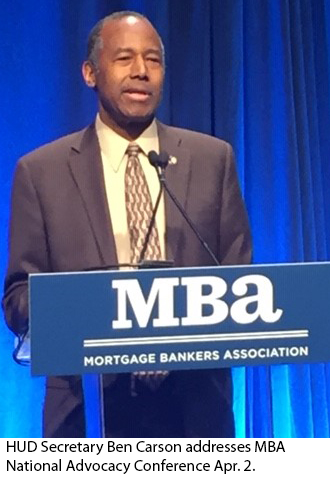
Carson Touts Administration Policies at MBA Advocacy Conference
WASHINGTON–HUD Secretary Ben Carson said a strong economy and Administration policies are creating more opportunities for housing and homeownership.
 “Housing is not just a pillar of our country, but the foundation of which our nation is built,” Carson said here yesterday at the MBA National Advocacy Conference. “We are a land of opportunity–but only if everyone has that opportunity.”
“Housing is not just a pillar of our country, but the foundation of which our nation is built,” Carson said here yesterday at the MBA National Advocacy Conference. “We are a land of opportunity–but only if everyone has that opportunity.”
A medical doctor by training, Carson noted financial optimism is at a 16-year high. “But every doctor knows that a patient can look like a paragon of health, while latent and localized conditions go untreated underneath,” he said. “If any part of the body is allowed to languish, every part of the body will eventually feel its pain. Our vital organs are all in it together. So too it is with America. We are only the Land of Opportunity when opportunity is available to all. And HUD is tasked with a special mission to carry our nation’s new gains to the local doorsteps of vulnerable communities who need help most.”
At HUD, Carson added, “our aim is to ensure every American has access to decent, safe and affordable housing. Both HUD and the MBA share a common understanding: that improving access to capital is a critical driver of economic opportunity.”
Carson cited Opportunity Zones, created through the Tax Cuts and Jobs Act of 2017, as an Administration success story. “Opportunity Zones are not a small, incremental initiative–they represent massive action to encourage financial capital to be invested in distressed communities,” he said.
The National Council of State Housing Agencies announced last month that its Opportunity Zone Fund Directory had expanded to nearly $24 billion dollars in anticipated investments. Of those $24 billion dollars, 91 percent of the funds are planning to invest in multifamily residential, student housing, mixed-use, hospitality or other commercial development.
“We have already heard positive reports from city officials that anticipated investments in Opportunity Zones have helped preserve and attract economic development into their localities,” Carson said. “And these are still just the early days. The Department of Treasury estimates Opportunity Zones will attract more than $100 billion dollars in private investment.”
Zillow, Seattle, reported this week that sale prices in Opportunity Zones grew by more than 20 percent annually after being selected, while appreciation slowed in similar communities not chosen as Opportunity Zones. Zillow said earlier in the year, sale prices in all eligible areas grew faster than prices in places that weren’t, but after Opportunity Zones were selected, price-growth trends diverged among eligible tracts.
“It’s still early, but we’re already seeing some signals that folks have begun to take up Uncle Sam on this offer,” said Zillow Policy Advisor Alexander Casey. “But whether this tax break will direct funds to the communities that need them the most–or what happens when money arrives–remain open questions.”
Carson said HUD is also adding positive incentives for construction and sale of affordable homes by expanding HUD’s Low-Income Housing Tax Credit Pilot for multifamily home development. “This expanded initiative will streamline the processing of FHA insurance applications for projects with equity from the LIHTC program,” he said. “It’s part of our commitment to further align our policies and underwriting towards supporting affordable housing production and preservation.”
On housing financing reform, Carson said HUD supports the Administration’s efforts to end the conservatorships of the GSEs; create competition in the housing finance market; establish regulation of the GSEs that safeguards their safety and soundness, while minimizing the risks they pose to the nation’s financial stability; and ensure the federal government is compensated for any support it provides to the GSEs or the secondary housing finance market.
Additionally, Carson said he is committed to reforming HUD through the following objectives:
–Addressing the financial viability of the Home Equity Conversion Mortgage program;
–Assessing the risks and benefits associated with providing assistance to first-time homebuyers;
–Defining the appropriate role of the FHA in multifamily mortgage finance;
–Diversifying FHA lenders through increased participation by registered depository institutions;
–Enhancing Ginnie Mae program participation requirements and standards to ensure its safety and soundness; and
–Reducing abusive and unsound loan origination or servicing practices for loans in the Ginnie Mae program.
Carson touted MBA’s support in HUD’s decision to discontinue FHA’s insurance of mortgages on homes that carried Property Assessed Clean Energy (PACE) liens. “FHA insurance not only put taxpayers at risk by allowing PACE liens to be placed ahead of the mortgage itself in the event of a default, it strongly threatened secured lenders by eroding the underlying mortgage collateral,” he said. “HUD appreciates that our decision to promote fiscal responsibility in this case was met with positive support by the MBA. Given the substantial risk that PACE loans represented to the FHA’s Mutual Mortgage Insurance Fund, I’m also reminded of an early lesson from medicine: ‘To treat a sick patient, the doctor has to stay healthy, too.'”
Carson expressed gratitude to MBA continued feedback and thought leadership on housing policy. “Solving affordable housing challenges requires a team effort,” he said. “It’s been said that, ‘the bigger the dream, the more important the team,’ and few ambitions are more compelling, or necessary, than that of the American Dream. HUD looks forward to continuing to work alongside the industry participants here today, so our common vision is a lived reality for all who call this great nation home.”
